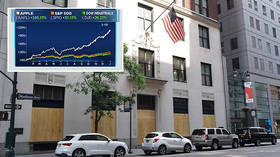V-shaped recovery of financial markets is a myth: They will be destroyed by a credit default tsunami

The commercial and residential property markets are on the brink of collapse. And central banks’ promise to print unlimited amounts of money will not solve the problem, but trigger a major financial crisis.
In New York on Tuesday, June 23, at around 13:45, the NASDAQ Composite Index traded at a new record high of 10,221.85. While US economic data indicates the nation is in the most severe depression in its history, the NASDAQ has surged an unprecedented 39 percent since Wednesday, April 1.
Are the current ‘V-shaped recovery’ price actions and stratospheric valuations of the NASDAQ justified or has reckless Federal Reserve money-printing permanently inflated wild asset bubbles in the stock, bond, property and credit markets?
Will these prices, manipulated by the extraordinary interventions of global central banks, create the most significant global financial crisis in history?
Stock market bubbles have nothing to do with prosperity on Main Street.
Also on rt.com Covid-19 may cause deepest economic crisis ‘of our lifetimes’ — WTO chiefHistory is necessary. It provides us with a perspective on what data points would be required to achieve the V-shaped recovery we have witnessed in the NASDAQ from April Fool’s Day to last Tuesday.
Consumer spending is a critical engine that drives economic growth in every economy. Accordingly, to have a substantial and sustainable economic recovery, the economy needs to be close to full employment. Is that where the US is now? Not even close. Around 50 million Americans are unemployed, and in the first quarter of 2020, the US gross domestic product contracted by 5 percent. The percentage of full-time employees relative to the working-age population is below 45 percent, the lowest in recorded history.
This current negative feedback loop between employment and consumption is not sustainable. The central banks have provided endless liquidity to the markets, which have seen enormous share buybacks, enabling momentum chasers to buy every dip and CEOs to profit handsomely – cannibalizing their corporation’s balance sheets at taxpayer expense, just like American Airlines CEO Doug Parker did. Stocks have ignored gravity, aka economic reality. In the words of the day trading community, “Stocks can only go up, right?”
One great example of central bank manipulation is Apple. Its shares traded at a new record last week of $372.78, seeing the tech giant’s market capitalization rocket towards 2 trillion dollars. The buyers of Apple shares must be thinking the 50 million debt-saturated, unemployed Americans are desperate to purchase a new $1,700 iPhone or a $4,500 MacBook Pro.
Nope. Central banks, specifically the Swiss National Bank and Federal Reserve, have purchased Apple’s shares and corporate bonds, inflating the ‘Apple bubble’ and funding massive stock buybacks. How does this help Main Street? It does not. It creates an illusion of profitability, widening the wealth gap and enriching the technology oligarchy.
Also on rt.com Forcing Chinese firms off American stock markets will backfire on US, Beijing warnsDuring his career at Apple, CEO Tim Cook’s total compensation is over 1 billion dollars. It 2018, it was $136 million and in 2019 dropped to $125 million. It is a safe bet Cook’s total compensation for 2020 will set a new record high, above $150 million a year.
An even more ridiculous example of irrational exuberance is the share price of Elon Musk’s Tesla. You know, the company that has three or four press releases a day and doesn’t keep to targets or make profits. Tesla’s shares also hit a record new high last week of $1,027.48, seeing its market capitalization surge to $190 billion.
Musk’s profitless company paid him a billion-dollar bonus this quarter. Still, I guarantee that those who purchased Tesla shares will regret it. Perhaps even as soon as the company’s next capital raise, because profitless corporations, like Tesla, that burn cash faster than a SpaceX rocket burns fuel, always need more funding. It’s similar to heroin junkies always needing the “next quick fix.” I can say that Elon Musk is one hell of a salesman – he likely put the “s” in snake oil.
Meanwhile, central banks have promised to print unlimited amounts of money, but they will never be able to print demand, and fail to recognise the difference between provision of liquidity and remedying basic issues of solvency.
Covid-19 has seen workforces across the globe collapse, and those Americans finding themselves among the employed 45 percent are lucky. They are allowed to work from the “safety” of their own homes. Covid-19 has crushed corporate profits and made management realize how it may be more profitable to have employees work from home rather than report to an office every day. Think about the savings: corporations can cut employees and rent payments.
Also on rt.com The Great Economic Depression of 2020: No lessons learned as central banks’ bazookas dribble or misfireThe 1,000-pound gorilla in the room no one sees or will acknowledge is the commercial and residential real estate markets. I know of many highly leveraged commercial property developers with massive loans that are either close to or already in default, with no prospect for tenants anywhere in sight.
This includes shops on every high street along with the enormous amount of now deserted and vacant strip malls and shopping centers across America. Likewise, with millions of unemployed Americans, the number of residential mortgage defaults is skyrocketing as well.
Not only that, but many parts of Manhattan look like hollowed-out war zones, featuring businesses dead, dark and shuttered with plywood boards covered in Black Lives Matter stickers.
It is unrecognisable from only a few months ago. In many of the condominium and co-op buildings, commercial tenants are boarded up and have closed permanently. The loss of income revenues generated by these commercial tenants will massively increase the owner’s monthly maintenance charges and instantly devalue the property values by a minimum of 30 percent.
The leveraged speculators who purchased these properties to flip or to let have even bigger problems. Firstly, there are no buyers or renters. Secondly, there is far too much supply at astronomical prices. In addition, the laws have been changed so if one purchased and rented out a two-bedroom property for $9,000 per month and the tenant cannot pay the rent, New York prohibits the speculator from evicting the tenant. Good luck servicing the mortgage debt on properties with zero income.
Also on rt.com Covid-19 has exposed ugliness of GLOBALISM & OPEN BORDERS – and given nations incentive to regain INDEPENDENCEHow far can Manhattan property prices plummet? Just as real estate prices collapsed in Japan by 90 percent, global property prices can do the same from pre-crime/Covid-19 price levels. Both the commercial and residential property markets are a train wreck in slow motion, and the bubble inflated by reckless Fed policy has popped.
Can the Federal Reserve ramp-up moral hazard to new highs by proclaiming: “We are buying all of the commercial and residential property and defaulted mortgages”? Highly unlikely. It already did that in 2008. While the Federal Reserve, Bank of Japan, European Central Bank and Bank of England excel at almost unlimited money printing and bailing out bankers while screwing taxpayers, time and time again they seem unable to understand that provision of unlimited capital to poorly managed insolvent corporations now does nothing other than kick the can down the road.
Moral hazard – heads I win, tails you lose – is the same as providing unlimited heroin to an addict, except it’s worse. This fiscal profligacy will destroy the global financial markets with a tsunami of credit defaults while also creating the widest and most dangerous wealth inequality in history, which will result in civil unrest and political instability for the next several generations.
Bubbles and Ponzi schemes both end the same way – badly. And this one will be no different.
Think your friends would be interested? Share this story!
The statements, views and opinions expressed in this column are solely those of the author and do not necessarily represent those of RT.













